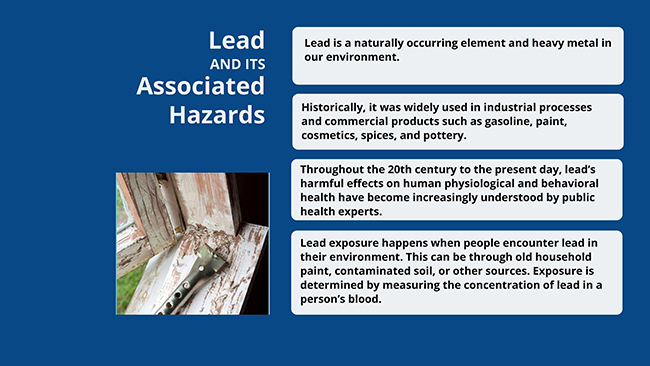Lead-Based Paint Inspections
The Lead-Based Paint Inspection Law (P.L. 2021, c.182)
New Jersey’s newest lead-based paint law, “New Jersey’s Lead-Safe Certification,” directly targets ALL pre-1978 rental properties.
The New Jersey Department of Community Affairs (DCA) has instituted P.L. 2021, c.182 (adopted as N.J.A.C. 5:28A), which requires that municipalities perform inspections of certain single-family, two-family, and multiple -rental dwellings for lead-based paint hazards.
Who is exempt from this requirement for New Lead-Safe Certification?
A “lead-safe certification” will be required prior to renting any residential dwelling unit unless the unit is:
- built in 1978 or later;
- certified to be free of lead-based paint;
- a single-family or two-family seasonal rental, rented for less than six months duration
- a multiple rental dwelling that has been registered with DCA for at least 10 years by the current or previous owner, and has no outstanding lead violations from the most recent DCA 5-year inspection; or,
- has a lead-safe certification issued within the last two years
Important Information for Beach Haven Inspections
New Jersey requires lead paint inspections, of interior spaces, including common areas, for all targeted rental units, or by July 24, 2024.
Beach Haven qualifies for visual inspections only. Inspectors will examine rental dwellings for deteriorated paint or visible surface dust, debris, or residue on all painted building components, especially any walls, windows, or trim. They will also look on surfaces that experience friction or impact.
After initial inspection and issuance of Lead-Safe Certifications, units shall be inspected for lead-based paint hazards every three years, or upon tenant turnover, whichever is earlier. An inspection upon tenant turnover will reset the clock for the three-year turnover.
To ensure compliance with the time frames established within P.L.2021, c.182, owners subject to P.L.2021, c.182, MUST notify municipalities of all tenant turnovers, especially in the event the lead-safe certificate has expired.
Lead-Safe Certification Inspection Procedure
Inspections must performed by either:
- The municipal inspector, contact the Construction and Zoning office for more information and/or to set up an inspection, 609-492-0111 x225 or x224; OR
- A New Jersey, DCA Certified Lead Evaluation Contractor, directly hired by the property owner to provide the required evaluation services. Use the following link to find Certified Lead Evaluation Contractors in New Jersey: Lead Evaluation Contractors per State of NJ
Procedures if Lead Hazards Are Identified
If a lead evaluation contractor or the municipal inspector finds that lead-based paint hazards exists:
Remediation:
- If deteriorated paint is found during the course of a visual assessment, the owner may elect to order a dust wipe inspection to confirm the presence of lead-based paint.
- The owner MUST remediate lead-based paint hazards by using lead-based paint hazard control methods (interim controls) or abatement. Remediation work must be performed by certified individuals in accordance with all applicable Federal and State regulations.
- Interim controls are measures designed to temporarily reduce human exposure to lead-based paint hazards. The measures include paint stabilization, making surfaces smooth and cleanable, and correcting dust-generating conditions. The United States Environmental Protection Agency (EPA) certifies Renovation, Repair, and Painting (RRP) contractors. These firms are certified to perform RRP work that addresses lead-based paint in homes. This work is often involved in interim control methods. Information may be found online, by following this link: Lead Renovation, Repair, and Painting Program. Interim controls that do not involve RRP work may be undertaken without specific certification.
- Abatement is more appropriate, in cases where interim controls are unlikely to be effective, to address lead-based paint hazards. All abatement work must be undertaken in accordance with the State regulations for Lead Hazard Evaluation and Abatement, which are described in N.J.A.C. 5:17. Abatement includes paint removal, building component replacement, and enclosure. The New Jersey DCA certifies Lead Abatement Contractors. A list may be found online, by following this link: Lead Abatement Contractors per State of NJ
- PERMITS MUST ALSO BE FILED WITH THE CONSTRUCTION & ZONING OFFICE.
Post-Remediation Inspection:
- After remediation, whether through interim controls or abatement, an additional inspection must be performed, by the municipal inspector, or a lead evaluation contractor hired by the owner, within 60 days of the initial inspection, to ensure there are no further lead-based paint hazards.
- When interim controls are used: if no lead-based paint hazards are found, the municipality or the inspector must certify the dwelling to be lead safe. This certificate is then valid for two years.
- If the dwelling has been remediated using abatement, and a lead abatement clearance certificate has been issued by the local enforcing agency, then the lead-free certificate shall exempt the dwelling from future inspections.
- Certificates, must be filed with the Construction & Zoning Office, in person, along with the $20.00 per unit, state fee.
Record Keeping and Disclosure Rules for Owners
The owner is required to:
- Provide required lead-safe certifications and history of tenant turnover to the municipal Construction and Zoning Department.
- Provide evidence of a lead-safe certification to tenants and affix a copy of such certification as an exhibit to the tenant’s lease.
- Maintain a record of the lead-safe certifications required to be obtained, which shall include the tenant’s name, if conducted during a period of tenancy.
- View Chapter 74 “Construction Codes, Uniform”, on the Beach Haven website, for the applicable Beach Haven requirements.
Useful Guides and Links
- Department of Community Affairs Guide: This guide is intended to provide a comprehensive overview of lead-based paint hazards, how to inspect for such hazards, and how hazards can be mitigated or eliminated for compliance with P.L.1012, c.182. The guide is intended to serve owners and residents of rental dwellings throughout the State of New Jersey.
- DCA’s Lead-Based Paint Inspections in Rental Dwellings Home Page:https://ecode360.com/8937730#8937730 The website provides definitions, details on procedures, answers to Frequently Asked Questions related to the law, and much more.
- Lead-Based Paint Law Webinar: https://www.youtube.com/watch?v=Xjnxefep79o


